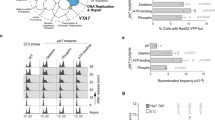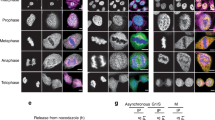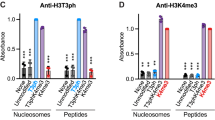Abstract
Changes in the structural organisation of chromatin are necessary for the progression of the cell cycle. These changes are thought to be regulated mainly by the modification of chromosomal proteins by reactions such as phosphorylation1–8, acetylation9–12, methylation13,14 and poly(ADP-ribosyl)-ation15,16. Among these modifications, phosphorylation of histones, especially that of the H1 histone, is the most likely candidate for a factor which regulates chromosome condensation1–8. It has been proposed that the phosphorylated form of H1 histone may be involved in the initiation of chromosome condensation1–4 or in the maintenance of the condensed state of chromatin8. The latter possibility is unlikely because zinc chloride, which inhibits phosphatase in vivo and preserves the highly phosphorylated form of H1 histone at metaphase, does not prevent the dispersion of chromosomes at the end of mitosis17. As for the former possibility, Bradbury et al. reported2 that the activity of H1 histone phosphorylation is closely correlated with mitotic triggering in the cell cycle and suggest3,4 that H1 histone phosphokinase is involved in the initiation of mitosis. However, no causal relationship has been established. To analyse the mechanism of the progression of the cell cycle, we have isolated several temperature-sensitive (ts) growth mutants from FM3A, a cell line derived from C3H mouse mammary carcinoma18. We report here on one of these ts mutants, designated the ts85 strain, which shows an abnormal chromosome condensation as well as deficiency in H1 histone phosphorylation at the non-permissive temperature. Our results support the hypothesis that H1 histone phosphorylation controls the initiation step of mitosis through chromosome condensation.
This is a preview of subscription content, access via your institution
Access options
Subscribe to this journal
Receive 51 print issues and online access
$199.00 per year
only $3.90 per issue
Buy this article
- Purchase on Springer Link
- Instant access to full article PDF
Prices may be subject to local taxes which are calculated during checkout
Similar content being viewed by others
References
Bradbury, E. M., Inglis, R. J., Matthews, H. R. & Sarner, N. Eur. J. Biochem. 33, 131–139 (1973).
Bradbury, E. M., Inglis, R. J. & Matthews, H. R. Nature 247, 257–260 (1974).
Bradbury, E. M., Inglis, R. J., Matthews, H. R. & Langan, T. A. Nature 249, 553–556 (1974).
Inglis, R. J., Langan, T. A., Matthews, H. R., Harder, D. G. & Bradbury, E. M. Expl Cell Res. 97, 418–425 (1976).
Gurley, L. R., Walters, R. A. & Tobey, R. A. J. Cell Biol. 60, 356–364 (1974).
Lake, R. S. & Saltzman, N. P. Expl Cell Res. 73, 113–121 (1972).
Marks, D. B., Paik, W. K. & Borun, T. W. J. biol. Chem. 248, 5660–5667 (1973).
Gurley, L. R., D'Anna, J. A., Barham, S. S., Deaven, L. L. & Tobey, R. A. Eur. J. Biochem. 84, 1–15 (1978).
Sealy, L. & Chalkley, R. Cell. 14, 115–121 (1978).
Jackson, V., Shires, A., Chalkley, R. & Granner, D. K. J. biol. Chem. 250, 4850–4863 (1975).
Sung, M. T. & Dixon, H. Proc. natn. Acad. Sci. U.S.A. 67, 1616–1623 (1970).
Ruiz-Carrillo, A., Wangh, L. J. & Allfrey, V. G. Science 190, 117–190 (1975).
Tiddwell, T., Allfrey, V. A. & Mirsky, A. E. J. biol. Chem. 243, 707–715 (1968).
Lee, H. W., Paik, W. K. & Borun, T. W. J. biol. Chem. 248, 4194–4199 (1973).
Tanuma, S., Enomoto, T. & Yamada, M. Biochem. biophys. Res. Commun. 74, 599–605 (1977).
Ueda, K., Omachi, A., Kawaichi, M. & Hayaishi, O. Proc. natn. Acad. Sci. U.S.A. 72, 205–209 (1975).
Tanphaichitr, N., Moore, K. C., Granner, D. K. & Chalkley, R. J. Cell Biol. 69, 43–50 (1976).
Nakano, N. Tohoku J. exp. Med. 88, 67–84 (1966).
Macpherson, I. & Montagnier, L. Virology 23, 291–294 (1964).
Nakano, M. M., Sekiguchi, T. & Yamada, M. Somatic Cell Genet. 4, 169–178 (1978).
Mita, S., Yasuda, H., Marunouchi, T., Ishiko, S. & Yamada, M. Expl Cell Res. (in the press).
Gurley, L. R. & Walters, R. A. Biochemistry 10, 1588–1593 (1971).
Panyim, S. & Chalkley, R. Archs Biochem. Biophys. 130, 337–346 (1969).
Author information
Authors and Affiliations
Rights and permissions
About this article
Cite this article
Matsumoto, Yi., Yasuda, H., Mita, S. et al. Evidence for the involvement of H1 histone phosphorylation in chromosome condensation. Nature 284, 181–183 (1980). https://doi.org/10.1038/284181a0
Received:
Accepted:
Issue Date:
DOI: https://doi.org/10.1038/284181a0
This article is cited by
-
Reorganization and condensation of chromatin in mitotic prophase nuclei of Allium cepa
Chromosoma (1994)
-
Molecular basis of Zinc related diseases
Indian Journal of Clinical Biochemistry (1992)
-
A structural basis for R- and T-banding: a scanning electron microscopy study
Chromosoma (1986)
-
The correlation between silver-staining and DAPI-induced chromosome undercondensation
Genetica (1986)
Comments
By submitting a comment you agree to abide by our Terms and Community Guidelines. If you find something abusive or that does not comply with our terms or guidelines please flag it as inappropriate.



